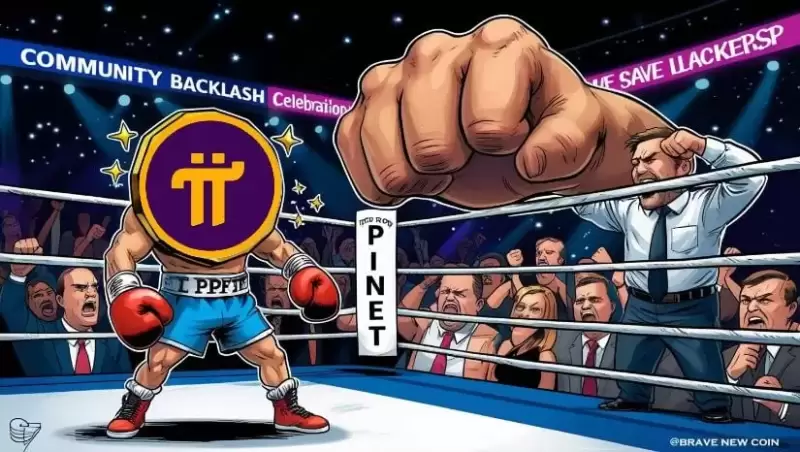 |
|
 |
|
 |
|
 |
|
 |
|
 |
|
 |
|
 |
|
 |
|
 |
|
 |
|
 |
|
 |
|
 |
|
 |
|
傳統金融長期以來一直在失敗,但其裂縫始終被忽視。在當前的經濟挑戰下,這些裂縫

Traditional finance has been failing for a long time, but its cracks have always been ignored. Under the current economic challenges, these cracks are finally showing up, and the shortcomings of the traditional financial system can no longer be overlooked. Nearly 1.4 billion people today remain unbanked. Around one-fourth of the global population is left behind by an industry that thrives on exclusion and inefficiency.
傳統金融長期以來一直在失敗,但其裂縫始終被忽視。在當前的經濟挑戰下,這些裂縫終於顯現出來,傳統金融體系的弊端已經不容忽視。如今,仍有近 14 億人沒有銀行帳戶。全球約四分之一的人口被一個因排斥和低效率而蓬勃發展的行業拋在了後面。
With their outdated models, traditional financial institutions continue to exclude those who lack access to documentation, credit histories, or stable infrastructure. This model works against a certain class of population, and there have been no notable changes over the years to increase inclusion. However, blockchain and the new generation of neobanks might have the answer to financial inclusivity in this new age of digital finance.
由於模式過時,傳統金融機構繼續將那些無法取得文件、信用記錄或穩定基礎設施的人排除在外。這種模式針對的是某一類人群,多年來並沒有發生顯著的變化來增加包容性。然而,區塊鏈和新一代新銀行可能會在數位金融新時代找到金融包容性的答案。
Even beyond inclusivity, traditional financial systems have outdated processes that are proving unmanageable in today’s fast-paced digital era. Consider international money transfers—banks still require days to finalize cross-border transactions, and they add hefty fees to them as well. Remittance charges can soar up to an average of 6.35%, which is significant when you consider the value of currencies in developing nations.
除了包容性之外,傳統金融體系的流程也已經過時,在當今快節奏的數位時代,事實證明這些流程難以管理。考慮一下國際匯款——銀行仍然需要數天時間才能完成跨境交易,而且還增加了高額費用。匯款費用平均可飆升至 6.35%,考慮到發展中國家的貨幣價值,這一數字相當可觀。
Neobanks built on blockchain infrastructure are changing this. Such platforms eliminate the need for middlemen, so transfers are faster, seamless, low-cost, and almost real-time. The use of decentralized networks removes the friction imposed by traditional banks, creating a financial system that serves everyone—not just the privileged few.
基於區塊鏈基礎設施的新銀行正在改變這一現狀。此類平台消除了對中間商的需求,因此轉帳速度更快、無縫、低成本且幾乎即時。去中心化網路的使用消除了傳統銀行施加的摩擦,創造了一個為所有人服務的金融體系,而不僅僅是少數特權階級。
The issue of financial inclusion is not new—it’s been a buzzword in the industry for years. Banks have been constantly scrutinized for overcomplicating onboarding processes and making key financial services inaccessible to socially struggling individuals. The majority of the unbanked population in the world lives in developing regions where financial institutions either don’t operate or have imposed insurmountable barriers to entry. The focus on documentation and credit history has shut out large populations, creating an unequal and unjust global financial system.
普惠金融問題並不新鮮——多年來它一直是業界的流行詞。銀行因入職流程過於複雜以及使社會困難個人無法獲得關鍵金融服務而不斷受到審查。世界上大多數沒有銀行帳戶的人口生活在發展中地區,這些地區的金融機構要么不運營,要么設置了難以逾越的准入障礙。對文件和信用記錄的關注已經將大量人口拒之門外,造成了不平等和不公正的全球金融體系。
Neobanks are challenging this by moving beyond paper-based identification and adopting decentralized models. Technologies like behavior-based identification models through the blockchain—which we are also leveraging at WeFi—can make banking accessible to those who would otherwise be locked out. These next-gen systems can help provide financial identities to users who have been left behind by traditional banks and give them access to equal financial opportunities.
新銀行正在透過超越紙質身分識別並採用去中心化模式來挑戰這一點。透過區塊鏈的基於行為的識別模型等技術(我們也在 WeFi 中利用了這些技術)可以讓原本會被拒之門外的人可以使用銀行服務。這些下一代系統可以幫助為被傳統銀行拋在後面的用戶提供金融身份,並讓他們獲得平等的金融機會。
When you deposit your funds to a bank, the general expectation is that it’s safe. You expect your funds to just sit in your account—untouched and free from financial issues. This is an illusion created by traditional financial institutes. Banks have complete access to your funds, and they will use them for lending, investment, and other purposes. Most banks operate under fractional reserve banking models, a highly vulnerable system. In case of too many withdrawal requests in a short period, these banks are prone to collapse. We’ve seen several cases like this during the Covid-19 pandemic. So, the perception that you have full control over the funds in your bank account is a mere illusion.
當您將資金存入銀行時,人們普遍期望資金是安全的。您希望您的資金只存在您的帳戶中—不受影響且不存在財務問題。這是傳統金融機構製造的錯覺。銀行可以完全使用您的資金,並將其用於貸款、投資和其他目的。大多數銀行在部分準備金銀行模式下運營,這是一個非常脆弱的系統。如果短時間內提款請求過多,這些銀行很容易倒閉。在 Covid-19 大流行期間,我們已經見過幾起類似的案例。因此,認為您可以完全控制銀行帳戶資金的想法只是一種幻想。
Neobanks are a great solution to this issue, especially platforms that offer non-custodial accounts. Users can retain full ownership and control over their assets, and the bank or any third party will not have any rehypothecation over them. This kind of autonomy is critical for financial resilience, especially in times of economic uncertainty.
Neobanks 是解決這個問題的一個很好的解決方案,特別是提供非託管帳戶的平台。使用者可以保留對其資產的完全所有權和控制權,銀行或任何第三方不會對其進行任何再抵押。這種自主權對於財務彈性至關重要,尤其是在經濟不確定時期。
Another major shortcoming of traditional finance is its approach to data. Centralized systems accumulate vast amounts of personal information from customers, creating honeypots for cybercriminals. The finance industry is a prime target for data breaches, with the sector accounting for 27% of all data breaches in 2023 alone. These centralized systems make individuals vulnerable to identity theft, fraud, and other forms of cybercrime, with little accountability on the part of financial institutions.
傳統金融的另一個主要缺點是其處理數據的方式。集中式系統累積了大量客戶的個人訊息,為網路犯罪分子創建了蜜罐。金融業是資料外洩的主要目標,光是 2023 年,該產業就佔所有資料外洩事件的 27%。這些中心化系統使個人容易遭受身分盜竊、詐欺和其他形式的網路犯罪,而金融機構幾乎不承擔任何責任。
Blockchain-based neobanks remove this vulnerability by decentralizing data. In this model, individuals retain control over their personal information, and data breaches become less likely due to the transparent and secure nature of the blockchain.
基於區塊鏈的新銀行透過分散數據消除了這一漏洞。在這種模型中,個人保留對其個人資訊的控制權,並且由於區塊鏈的透明和安全性質,資料外洩的可能性變得較小。
Whenever a user hears about neobanks or blockchains, the first thought that pops up is ‘crypto is volatile’—its wild price fluctuations are a major worry for the mass population.Stablecoins provide a solution, offering the stability of traditional currencies while maintaining the speed, transparency, and security of blockchain technology. They create a way for users to avoid the risks associated with volatile assets, ensuring that their financial transactions remain stable and predictable.
每當用戶聽到新銀行或區塊鏈時,第一個想到的就是「加密貨幣波動很大」——其劇烈的價格波動是大眾的主要擔憂。貨幣的穩定性,同時保持了速度區塊鏈技術的透明度和安全性。它們為用戶創造了一種避免與波動性資產相關的風險的方法,確保他們的金融交易保持穩定和可預測。
The future of finance will inevitably revolve around stablecoins, as they offer a clear path to financial inclusion without exposing users to the high-risk nature of the broader cryptocurrency market. These digital assets make financial services accessible, transparent, and reliable for anyone, anywhere.
金融的未來將不可避免地圍繞著穩定幣展開,因為它們提供了一條明確的金融包容性路徑,而不會讓用戶面臨更廣泛的加密貨幣市場的高風險。這些數位資產使任何人、任何地方都可以獲得、透明且可靠的金融服務。
The cracks in traditional finance are deepening. For too long, banks have held control over money and dictated who can participate in the financial system. It resulted in billions of people being left behind, either because they lack documentation, live in
傳統金融的裂痕正在加深。長期以來,銀行一直控制著貨幣,並規定了誰可以參與金融體系。這導致數十億人被拋在後面,要么因為他們缺乏證件,要么因為居住在
免責聲明:info@kdj.com
所提供的資訊並非交易建議。 kDJ.com對任何基於本文提供的資訊進行的投資不承擔任何責任。加密貨幣波動性較大,建議您充分研究後謹慎投資!
如果您認為本網站使用的內容侵犯了您的版權,請立即聯絡我們(info@kdj.com),我們將及時刪除。
-

-

-

- 越過高原:現在的動力在哪裡
- 2025-04-03 12:15:13
- Chainlink和Vechain都在加密空間中建立了堅實的聲譽
-

-

- 隨著投資者要求領導更改,PI網絡(PI)的價格下跌20%
- 2025-04-03 12:10:13
- Pi Coin的交易量也暴跌,反映了投資者的信心。儘管PI Core團隊宣布了高級,但令牌的下降仍在繼續
-

-

- 諸如官方特朗普和邦克(Bonk)等模因驅動的令牌失去了動力
- 2025-04-03 12:05:13
- 諸如官方特朗普和邦克(Bonk)等模因驅動的令牌最近引起了很多關注,因為它們的能力傳播
-

- Vaneck推出了與Celestia(TIA)區塊鏈相關的新金融產品
- 2025-04-03 12:05:13
- Vaneck推出了與Celestia相關的新金融產品,這是一個旨在提高可擴展性和數據可用性的區塊鏈。
-

- 冷軟件(冷) - 加密的未來?
- 2025-04-03 12:00:12
- 在不斷發展的加密貨幣世界中,投資者一直在尋找新的創新項目,這些項目提供真正的實用性



























































